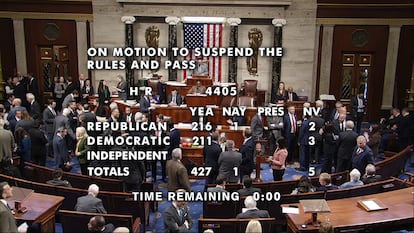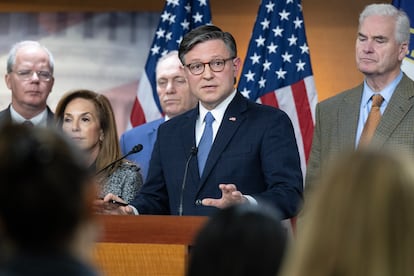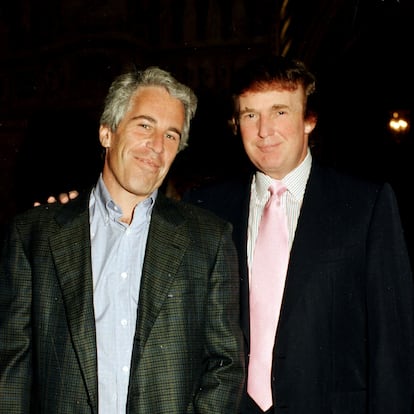The question wasn't whether the Epstein Papers Transparency Act would pass the House of Representatives on Tuesday, but rather how much Republican support the bill would receive. The bill requires the Justice Department to declassify documents related to the case of the millionaire pedophile, after months of refusal by Donald Trump and his administration to release them. Also remaining to be resolved, once it had passed this first hurdle, was whether it would face obstacles on its path through the Senate to the desk of the President of the United States, who has promised to sign it.
The answer to the first question was: everyone except one, Clay Higgins, Republican representative from Louisiana and a politician loyal to Trump. And the explanation for this overwhelming support? After weeks of pressure to the contrary, the president, who was Epstein's friend for 15 years, gave his party's members of Congress permission last Sunday to vote in favor of the bill. Although he didn't go as far as he could have: he has the power to order the release of these files without the need for Capitol Hill approval, but he has chosen not to. These files could reveal the involvement of dozens of wealthy and influential men in the pedophile's sex trafficking ring, as well as the complicity of financial institutions and judicial bodies, or the failures of the authorities who allowed him to act with impunity.

As for the second question, it began to clear up a couple of hours after the vote. At least, regarding the timing. Senate Majority Leader John Thune promised that the Senate would vote on it soon, as early as Tuesday.
House Speaker Mike Johnson, whose decision to keep the House in recess for 54 days delayed the legislative process during the longest government shutdown in U.S. history, had suggested earlier in the day that the Senate would introduce amendments to the bill. Johnson criticized the legislation because, he said, “it does not contain provisions to protect the identity of victims,” even though dozens of victims went to the Capitol on Tuesday to pressure him and his colleagues for its passage.
The Speaker is also concerned that the reputation of those who were part of Epstein's inner circle—who committed his crimes between the early 1990s and his death (a suicide, according to the coroner) in 2019 in a maximum-security cell in Manhattan, while awaiting trial as the head of an international child sex trafficking ring—will be damaged by the release of these materials, should they ultimately be found not guilty. It is these same reservations that led Higgins, the sole dissenter, to vote no.
“The legislation has serious flaws. And Republicans must work to correct those flaws in the Senate if this legislation is passed,” Johnson stated shortly before the vote. Despite this, and despite his party having worked for months to prevent this moment, he mistakenly predicted unanimous support.

Thune, for his part, suggested that the Senate would process the bill without changes. If, on the other hand, Senate Republicans opted to amend the text, that could delay a process that began after Attorney General Pam Bondi said last July that she would not release Epstein's files despite having promised to do so for months.
That change of heart, which came after a White House meeting in which Bondi warned Trump that his name was “all over” the millionaire pedophile’s papers, set the House Oversight Committee to work. The committee has received some 65,000 pages of documents—the latest batch, of about 20,000 emails, last week—through court orders served on Epstein’s family. Its members have also requested material from the Justice Department, which holds a vast amount of material, estimated at millions of pages, but the Trump Administration has repeatedly refused to cooperate with the investigation.
From both parties
The news that the Trump Administration would not release the files also forged an alliance between representatives of both parties, Ro Khanna (Democrat from California) and Thomas Massie (Republican from Kentucky), to draft the bill that was put to a vote today. That initiative had the support of all Democrats and four Republicans: in addition to Massie, who said on Tuesday he was “ashamed of his own party,” Representatives Lauren Boebert (Colorado), Nancy Mace (South Carolina), and Marjorie Taylor-Greene (Georgia).
Boebert was summoned to the White House last Wednesday to be pressured, but the attempt to prevent her from signing the petition that advanced the law after the government reopened was unsuccessful. “We have had to fight intimidation for months,” Greene said Tuesday shortly before 1 p.m. (local time). He spoke from the Democratic side of the House floor before a chamber where only a handful of representatives were present.
The congresswoman used to be one of the most prominent faces of the MAGA (Make America Great Again) movement on Capitol Hill, but her advocacy for Epstein's victims has put her at odds with Trump, who last week denounced her in a series of aggressive messages calling her a"traitor." These, she says, led to threats and other intimidation tactics from the president's supporters.

Hours earlier, Greene had spoken at an event alongside dozens of “survivors” of Epstein’s sexual abuse. It was a defiant press conference, in which almost all the victims present—just a few among the hundreds of victims of the millionaire pedophile—spoke after showing photos of themselves from when they met Epstein, “some as young as 14,” as Representative Mace recalled when it was her turn to speak in the House.
One of them, Haley Robson, spoke for them all when she told Trump during his appearance on the steps of the Capitol: “I’m traumatized, but I’m not stupid.” Those who spoke afterward echoed their messages to the President of the United States, asking him not to “politicize” their suffering. They also demanded that he stop referring to the attempt to declassify Epstein’s documents as a “Democratic hoax.” During the debate on the bill, this group of victims interrupted the Democratic interventions with applause from the visitors’ gallery.
“What is Trump hiding? What is Bondi hiding?” asked Congressman Robert Garcia, the ranking member of the House Oversight Committee, during a passionate intervention. Meanwhile, Jim Jordan (Ohio) wanted to know why the documents weren't released during the Biden administration. Jamie Raskin (Maryland) responded by reminding his rivals that for part of those four years there was an open case against Epstein's accomplice, the fixer Ghislaine Maxwell. She is now serving a 20-year sentence in a minimum-security prison, a prison benefit she obtained after meeting in July with Justice Department envoy Todd Blanche for nine hours over two consecutive days.
US law prohibits the release of materials from a trial summary while the case is still active, and Democrats fear the Trump administration will use this as justification for continuing to refuse to release the files. Last Friday, Trump asked Bondi, in a move that violates the principle of separation of powers in this country, to open investigations only against prominent Democrats whose names have appeared in successive releases of documents. He cited three: former President Bill Clinton; Larry Summers, former president of Harvard; and Democratic mega-donor Reid Hoffman.
Bondi put a New York prosecutor to work. If the cases prosper, that would serve as an excuse for the Justice Department not to release the documents that all but one member of the House of Representatives, along with dozens of victims of the man a judge once described as"the greatest sexual predator in U.S. history," were asked to publish on Tuesday.
When the law was passed on Tuesday, those in the visitors' gallery of Congress burst into applause, while blowing kisses to the Democratic benches and mouthing"thank you".

